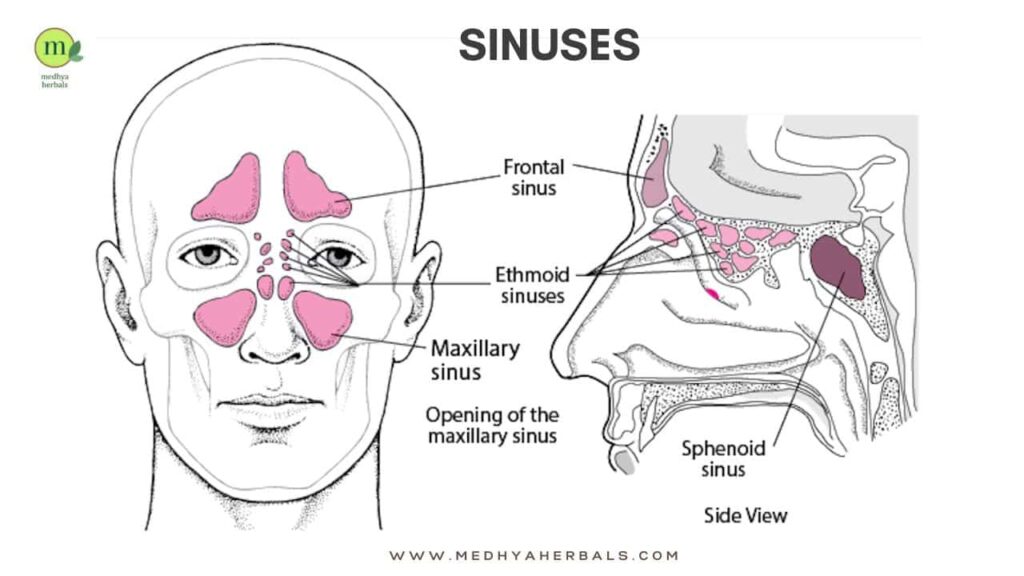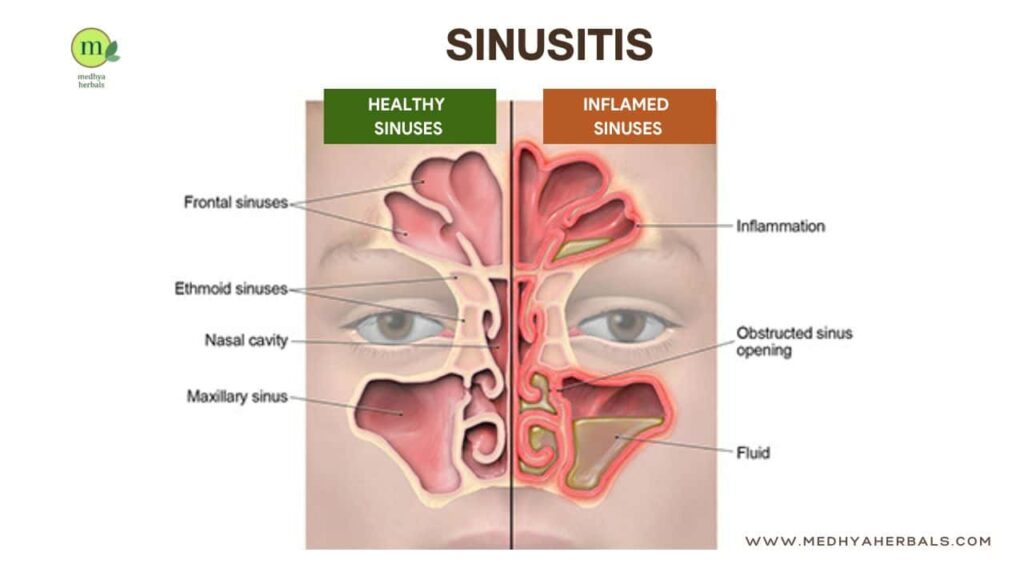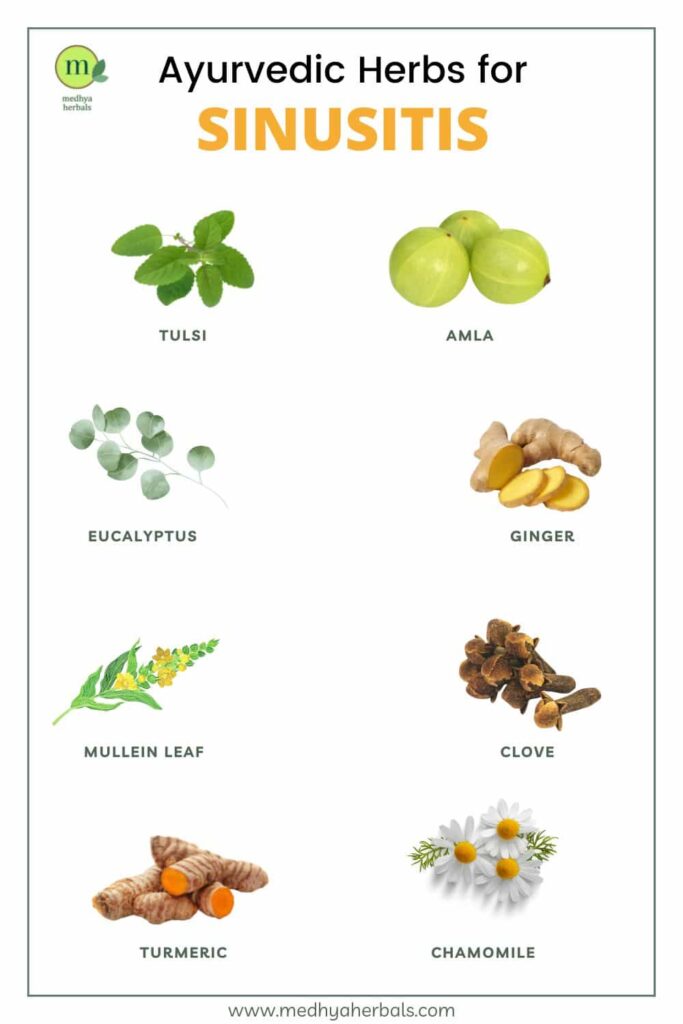Sinusitis is a condition that occurs when the sinuses become inflamed, swollen and filled with excess mucus. People who suffer from sinusitis often experience a range of symptoms that can be debilitating, including headaches, difficulty in breathing, facial pain, colored nasal discharge, congested nose, and fatigue. Chronic sinusitis can be very debilitating, making it hard to go about your everyday activities.
In most cases, sinusitis can be treated with home remedies or over-the-counter medications. However, in cases of chronic sinusitis, a systematic approach of treatment is required to prevent recurring inflammation of the sinuses.
If you are suffering from chronic sinusitis, Ayurveda can help. Ayurveda is an effective treatment for sinusitis because it addresses the root cause of the problem, rather than just treating the symptoms.
The Sinuses
The sinuses are a network of hollow cavities in the skull. They are connected to the nose and help to filter and moisten the air that we breathe through thin mucus that they release.
The mucus that sinuses make drains out of the nose. It also help to protect the lungs by trapping bacteria and other particles which could cause infection.
There are four main types of sinuses: frontal, ethmoid, sphenoid, and maxillary. Each type is located in a different part of the skull.

What is Sinusitis?
Sinusitis is a common condition that affects millions of people each year. In sinusitis, the lining of the sinuses becomes inflamed and swollen. This inflammation causes sinuses to produce more mucus than normal, leading to a stuffy nose, pain in the sinuses, and difficulty in breathing.
Apart from the congestion, excess mucus also provides breeding ground for microbes as bacteria, fungi and viruses, which can cause infection.
Sinusitis can be acute, which means it lasts for a short period of time, or chronic, which means it lasts for more than three months.
Types of Sinusitis
Acute (short-term): It typically lasts for four weeks or less. Acute sinusitis is usually caused by a viral infection, such as the common cold.
Chronic (long-term): Chronic sinusitis is sinus inflammation that lasts for three months or longer. It can be caused by allergies, environmental irritants and structural problems in the nose.

Symptoms of Chronic Sinusitis
The symptoms of chronic sinusitis can vary from person to person, but they often include:
- Stuffy nose
- Mucus buildup
- Blocked Ears
- Swelling and Redness in the eye area
- Pain in the sinuses
- Fever
- Bad breath
- Fatigue
- Heavy head and Headaches
- Facial Pain or pressure that doesn’t go away
- Thick and yellow or green nasal discharge
- Nasal discharge that lasts for more than 10 days
Health Complications of Chronic Sinusitis
- Migraines: Migraines are a type of headache that can be caused by inflammation in the sinuses.
- Asthma: Asthma is a condition that causes the airways to narrow and makes it difficult to breathe. Sinusitis can trigger asthma attacks.
- Chronic Obstructive Pulmonary Disease (COPD): COPD is a group of conditions that make it difficult to breathe. Sinusitis can worsen the symptoms of COPD.
- Ear Infections: Ear infections can occur when the sinuses become inflamed and swell up. This can cause fluid to build up in the middle ear and lead to an infection.
- Anemia: Anemia is a condition in which there are not enough healthy red blood cells. Sinusitis can cause anemia by causing bleeding in the sinuses.
Causes of Sinusitis
There are a number of possible causes of sinusitis, including:
- Allergies: Allergies as rhinitis can cause the sinuses to become inflamed and swollen. This can be due to a variety of things, including pollen, dust, pet dander, and mold.
- Poor Immunity and Infections: Viral, bacterial or fungal infections in the sinuses and other parts of the respiratory system can spread as a result of weak immune system function.
- Smoke Inhalation: Smoke from cigarettes or other sources can irritate the sinuses and cause them to become inflamed.
- Environmental Irritants: Things like pollution, chemicals, and dry air can all contribute to sinusitis.
- Structural Problems: Some people have structural problems in their nose that make it difficult for mucus to drain properly. This can lead to a buildup of mucus and inflammation. Nasal polyps are one example of a structural problem that can cause sinusitis.
Conventional Treatments for Sinusitis
There are a number of possible treatments for sinusitis, including:
- Home Remedies: There are a number of things you can do at home to help relieve the symptoms of sinusitis, including drinking plenty of fluids, using a humidifier, and avoiding irritants.
- Medications: over-the-counter and prescription medications can help to reduce inflammation and clear out mucus. Decongestants, antihistamines, and corticosteroids are all examples of medications that can be used to treat sinusitis.
- Surgery: In some cases, surgery may be necessary to correct a structural problem in the nose or to remove nasal polyps.
Ayurvedic Treatment for Chronic Sinusitis
In Ayurveda, chronic sinusitis is considered to be Kapha Vata dosha imbalance disorder. Since, Kapha dosha primarily resides in the head and nose, hence it is likely to get vitiated when faulty diet and lifestyle is practiced or when kapha dominating environmental conditions persist. An imbalanced kapha blocks the flow of vata dosha, thus creating breathing problems too.
Sinusitis is classified as Kaphaja Siroroga, disease of the head that arises due to Kapha dosha imbalance. Chronic sinusitis cases are classified as Suryaavartha and Dushtapratishyaya under siroroga and nasyaroga specifically.
One of the first things that is done in Ayurvedic treatment for chronic sinusitis is detoxification to breakdown and expel the toxins out via the easiest and nearest elimination pathway i.e. the nose. This can be done with Ayurvedic herbs and panchakarma therapy. Along with the immune system is strengthened with rasayana to counter any allergens and microbial infections.
In addition, diet and lifestyle practices that prevent formation of toxins and balance vata kapha dosha are suggested by Ayurvedic doctors to prevent recurrence of infections.
Ayurvedic Treatment Therapies for Chronic Sinusitis
- Neti or Nasal Irrigation: Nasal irrigation is a process of flushing out the sinuses with saline water. This can help to reduce inflammation and clear out mucus.
- Steam Inhalation: Steam inhalation can help to thin out mucus and make it easier to drain.
- Nasya: Nasya is a treatment in which medicated oils are used to cleanse and lubricate the nasal passages. This can help to reduce inflammation and clear out mucus. Nasya is the prime treatment to remove the aggravated doshas in all types of siroroga and nasyaroga.
- Applying sesame oil to soles: Applying sesame oil to the soles of the feet can help to reduce inflammation and promote drainage.
- Herbal Remedies: There are a number of herbs that can be used to treat sinusitis, including turmeric, ginger, garlic, and cayenne pepper.
- Diet: A healthy diet is important for overall health, but it’s especially important in chronic sinusitis treatment. Eating a diet that is rich in fruits, vegetables, and whole grains can help to reduce inflammation and improve immune function.
Ayurvedic Herbs for Treatment of Chronic Sinusitis
There are a number of herbal remedies that can be used to treat chronic sinusitis. Some of these herbs include:

Anti-inflammatory and Antimicrobial Herbs to Treat Infection and Inflammation
- Tulsi
- Garlic
- Clove
- Eucalyptus
- Fenugreek
Herbal Expectorants to melt and expel the Phlegm Out
- licorice
- cinnamon
- ginger
- aniseed
Herbs to detox and prevent mucus formation
- chitrak
- amla
- long pepper
- black pepper
Ayurvedic Dietary Tips for treatment of chronic sinusitis
There are a number of dietary changes that can help to reduce the symptoms of chronic sinusitis. Some of these dietary tips include:
- Drinking plenty of fluids: Drinking fluids helps to thin out mucus and prevents dehydration.
- Eating foods rich in Vitamin C: Vitamin C is an antioxidant that can help to reduce inflammation. Foods rich in Vitamin C include citrus fruits, herbs, and cruciferous vegetables.
- Eating spicy foods: Spicy foods help to open up the sinuses and clear out mucus.
- Avoiding dairy products: Dairy products can increase mucus production and make congestion worse.
- Limit cold foods and beverages as they can trigger sinus symptoms.
- Avoid fruits in the night and limit consumption of watery fruits and vegetables.

Ayurvedic Lifestyle Tips for Chronic Sinusitis
There are a number of lifestyle changes that can help to reduce congestion and make breathing easier. Some of these lifestyle recommendations include:
- Avoiding smoking: Smoking irritates the sinuses and can make symptoms worse.
- Limiting time spent indoors: Indoor air is often dry and dusty, which can irritate the sinuses.
- Avoiding environmental triggers: If you know of any environmental triggers that worsen your symptoms, it’s important to avoid them. Common triggers include pollen, pet dander, and cleaning products.
- Using a humidifier: A humidifier can help to add moisture to the air and reduce congestion.
Takeaway
Chronic sinusitis can lead to a number of health complications, it’s important to see a doctor if you think you may have the condition. Early diagnosis and treatment can help to prevent these complications from occurring.
Ayurveda is a holistic and natural system of medicine that focuses on treating the whole person, rather than just the symptoms of a disease. Ayurvedic treatment for chronic sinusitis is highly effective to address the root cause of sinusitis and give permanent relief.
Consult with Medhya’s Ayurvedic Doctor to get your personalised health plan involving prescription for Ayurvedic medicine, diet, yoga and lifestyle guidelines.
References
EFFICACY OF AYURVEDIC MEDICINE IN THE TREATMENT OF UNCOMPLICATED CHRONIC SINUSITIS
PARANASAL SINUSITIS (APEENASA/PEENASA) AND ITS MANAGEMENT IN AYURVEDA

